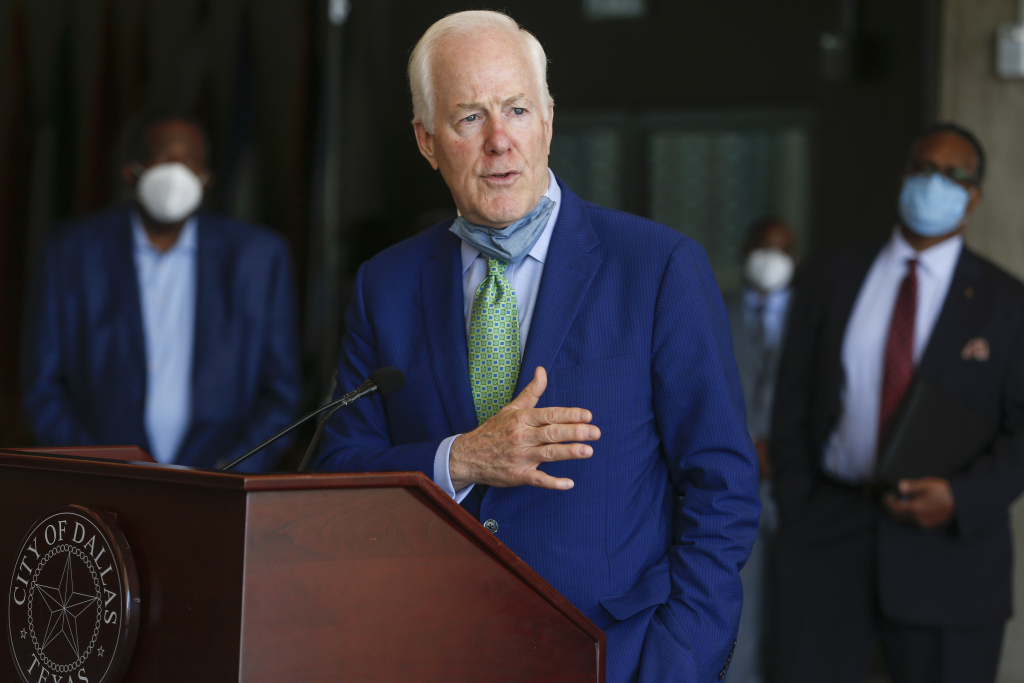Senator John Cornyn Stuns Washington by Backing a Partial Filibuster “Nuke” for Spending Bills — A Move That Could Hand Republicans 51-Vote Control Amid Trump’s Pressure to Act
Washington’s power balance could be on the verge of a historic shift after Senator John Cornyn signaled openness to partially dismantling the Senate filibuster — a move that would allow Republicans to pass crucial funding and appropriations bills with just 51 votes instead of the usual 60. The revelation, first reported by Punchbowl News, sent ripples through Capitol Hill, signaling that the GOP may finally be ready to embrace the kind of procedural muscle Donald Trump has been urging behind closed doors.
Cornyn, a senior Republican from Texas and long-respected institutionalist, has typically stood on the side of preserving Senate norms. But his latest comments mark a remarkable softening — and perhaps the first crack in the wall of resistance among establishment Republicans who have long resisted Trump’s calls to “nuke the filibuster.” During a closed-door discussion, Cornyn reportedly told colleagues that in “certain cases,” such as appropriations bills or legislation to prevent government shutdowns, the 60-vote rule has become a tool for dysfunction rather than deliberation. It was a subtle but significant statement — one that echoes the former president’s warning just days earlier that the GOP would remain a “dead party” if it refused to adapt.

For years, the Senate filibuster has been viewed as both the symbol and safeguard of bipartisanship — the procedural hurdle requiring 60 votes to advance most legislation. But to Trump and his allies, it’s an outdated relic that paralyzes a country already divided by gridlock and weaponized partisanship. Trump has repeatedly slammed Senate Republicans for what he calls “timid loyalty to broken rules,” urging them to adopt a “fighter’s mindset” and use the power voters gave them. “You can’t save a country if you’re afraid of your own strength,” Trump told supporters at a rally last week. Cornyn’s latest remarks suggest that message may finally be hitting home.
Behind the scenes, sources familiar with the GOP’s internal talks describe growing frustration with the Senate’s inability to pass meaningful legislation during times of crisis — particularly when it comes to government funding. With the nation facing yet another shutdown standoff and public confidence in Congress at record lows, even some moderate Republicans are starting to question whether the filibuster has outlived its purpose. “It was designed for debate,” one GOP aide said privately. “But what we have now isn’t debate — it’s paralysis. Cornyn sees that. He’s pragmatic.”

Trump’s allies in the Senate, including Senators J.D. Vance, Rick Scott, and Josh Hawley, have been increasingly vocal about ending the filibuster altogether. They argue that Democrats have weaponized procedural rules when out of power but show no hesitation to override them when in control. “It’s time Republicans stop playing defense,” Vance said in an interview last month. “The Democrats will nuke it the second it benefits them — why should we wait for that?”
Cornyn’s cautious endorsement of a “targeted carve-out” appears to be an attempt to bridge both worlds — honoring Senate tradition while responding to political reality. Under his proposed framework, the 60-vote requirement could remain for most legislation but be temporarily suspended for appropriations bills or critical funding packages, especially those tied to national security or preventing government shutdowns. “It’s not a total elimination,” Cornyn clarified, “but we can’t keep holding the American people hostage every time Congress can’t agree to pay its own bills.”

That statement alone marks a sharp departure from Cornyn’s reputation as one of the Senate’s most procedural-minded Republicans. For years, he stood shoulder to shoulder with leaders like Mitch McConnell in defending the filibuster as a “safeguard against mob rule.” But now, with McConnell’s influence waning and Trump’s grip on the GOP stronger than ever, even the old guard appears to recognize the changing tides. “Cornyn isn’t a bomb-thrower,” said a former Senate aide who worked with him during the Bush administration. “If he’s opening the door to reform, it means serious conversations are happening.”
Democrats, however, have reacted with alarm — and more than a hint of irony. For years, progressives like Elizabeth Warren and Bernie Sanders have pushed to scrap the filibuster to advance their own agenda, only to face resistance from centrist Democrats and Republicans alike. Now, with Trump-aligned conservatives considering the same move, the left finds itself on the defensive. Senate Majority Leader Chuck Schumer has already warned that such a change would “destroy what’s left of the Senate’s integrity,” calling Cornyn’s remarks “reckless.” But Republicans point to Democrats’ own selective use of the “nuclear option” when it suited them — most notably in 2013, when Democrats eliminated the filibuster for most judicial nominees, paving the way for Mitch McConnell’s later extension of the rule to Supreme Court confirmations.

The potential political implications are enormous. If Republicans succeed in carving out an exception for appropriations and shutdown-related bills, they could effectively govern with a simple majority whenever they control the Senate and White House. That would allow the GOP to pass budget reforms, border security measures, and energy legislation without needing Democratic buy-in — a massive strategic advantage heading into the 2026 midterms.
It’s also a move that could rally the Republican base at a time when the party is eager to demonstrate unity and strength after months of internal division. The image of Trump pressing senators to “grow a spine” behind closed doors has already electrified conservative media, where commentators have hailed Cornyn’s statement as “the first domino to fall.” On talk radio and online forums, grassroots conservatives are calling it “Trump’s influence in action.”
Still, not everyone in the GOP is ready to go nuclear. Senator Susan Collins of Maine and Lisa Murkowski of Alaska have both expressed skepticism, warning that removing the filibuster — even partially — could backfire if Democrats regain power. “You can’t unring that bell,” Murkowski told reporters. “Whatever tool we use today will be used against us tomorrow.” Cornyn’s measured language, by contrast, appears to acknowledge that risk, proposing only “situation-specific” exceptions rather than a full repeal.

But even that limited change would be monumental. For decades, the Senate has prided itself on being the world’s greatest deliberative body — a chamber where the minority’s voice cannot be easily silenced. Yet in today’s polarized climate, critics argue that the filibuster has morphed into a political weapon, used not to protect debate but to guarantee stalemate. The result has been a series of near-constant funding crises, delayed budgets, and last-minute continuing resolutions that leave both parties blaming the other. “We’re governing by panic,” Cornyn said recently, echoing a sentiment shared by many Americans. “And that’s not sustainable.”
Political observers say Cornyn’s evolution could be a sign of where the broader Republican Party is headed — pragmatic, strategic, and increasingly aligned with Trump’s calls for decisive leadership. “Cornyn isn’t someone who moves with the wind,” said political analyst Mollie Hemingway. “If he’s reconsidering the filibuster, it means he’s hearing from voters and donors that patience has run out with the status quo.”

At its core, the filibuster debate is about power — who wields it, who blocks it, and who dares to change it. With the government shutdown still casting a shadow over Washington and the 2026 midterms looming, Trump’s message resonates more than ever: the GOP can either lead boldly or be led into irrelevance. Cornyn’s shift doesn’t mean the filibuster is dead — not yet — but it does signal a new chapter in the party’s fight to reclaim control of Washington.
For now, the question remains whether other Republicans will follow Cornyn’s lead. As Trump continues to pressure senators behind closed doors, the old guard faces a choice: cling to procedural purity or embrace the aggressive reform their base demands. The stakes could not be higher. If Republicans truly move to weaken the filibuster, they could unleash a new era of majority rule — one that might redefine the Senate, reshape America’s legislative process, and fulfill Trump’s long-standing call to “fight like hell” for the people who put them there.
Cornyn’s quiet words have set the stage for a loud national reckoning. And as the debate heats up, one thing is certain — the days of business as usual in the Senate may finally be numbered.



